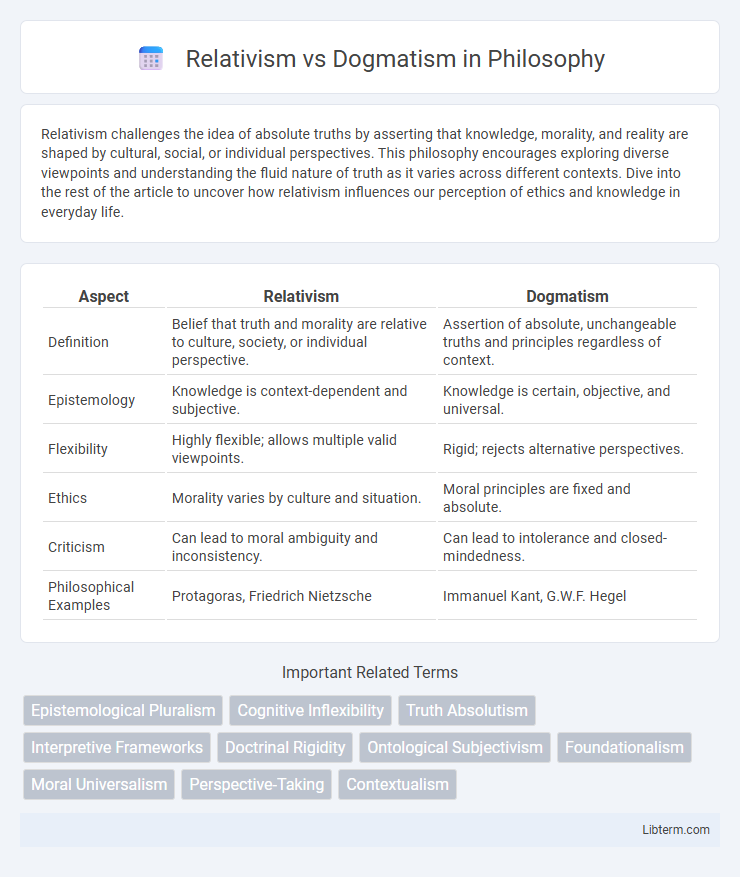Relativism challenges the idea of absolute truths by asserting that knowledge, morality, and reality are shaped by cultural, social, or individual perspectives. This philosophy encourages exploring diverse viewpoints and understanding the fluid nature of truth as it varies across different contexts. Dive into the rest of the article to uncover how relativism influences our perception of ethics and knowledge in everyday life.
Table of Comparison
| Aspect | Relativism | Dogmatism |
|---|---|---|
| Definition | Belief that truth and morality are relative to culture, society, or individual perspective. | Assertion of absolute, unchangeable truths and principles regardless of context. |
| Epistemology | Knowledge is context-dependent and subjective. | Knowledge is certain, objective, and universal. |
| Flexibility | Highly flexible; allows multiple valid viewpoints. | Rigid; rejects alternative perspectives. |
| Ethics | Morality varies by culture and situation. | Moral principles are fixed and absolute. |
| Criticism | Can lead to moral ambiguity and inconsistency. | Can lead to intolerance and closed-mindedness. |
| Philosophical Examples | Protagoras, Friedrich Nietzsche | Immanuel Kant, G.W.F. Hegel |
Understanding Relativism and Dogmatism
Relativism asserts that knowledge and truth are context-dependent, varying across cultures and perspectives, which challenges absolute or universal claims. Dogmatism, conversely, maintains rigid adherence to established principles or beliefs, often dismissing alternative viewpoints and resisting critical examination. Understanding these concepts involves recognizing relativism's emphasis on flexibility and pluralism alongside dogmatism's focus on certainty and authoritative conviction.
Historical Roots of Relativism and Dogmatism
Relativism traces its historical roots to ancient Greek sophists who emphasized subjective truth and cultural context, challenging absolute knowledge claims. Dogmatism originates from classical philosophical traditions, notably Plato and Aristotle, advocating for fixed, universal truths and certainties. These opposing foundations highlight the enduring debate between flexible interpretation and rigid adherence to established doctrines in epistemology.
Core Principles of Relativism
Relativism asserts that truth and morality are not absolute but vary based on cultural, historical, or personal perspectives, emphasizing context-dependent understanding. It challenges dogmatism by rejecting fixed, universal truths, promoting open-mindedness and tolerance toward diverse beliefs and values. Core principles include epistemic humility, recognition of pluralism, and the belief that knowledge and ethics are constructed within specific social frameworks.
Defining Dogmatism: Key Characteristics
Dogmatism is characterized by an unwavering adherence to specific beliefs or doctrines, often rejecting alternative viewpoints regardless of evidence. It involves a rigid mindset that resists questioning or critical examination, fostering an environment where certainty is maintained without flexibility. This inflexibility distinguishes dogmatism from more open philosophical stances like relativism, which embrace multiple perspectives and contextual understanding.
Relativism vs Dogmatism: Major Differences
Relativism emphasizes the belief that knowledge and truth are context-dependent, varying across cultures, perspectives, or situations, while dogmatism asserts fixed, absolute truths regardless of differing viewpoints. Relativism promotes open-mindedness and adaptability by recognizing multiple valid perspectives, contrasting with dogmatism's rigidity and intolerance toward alternative beliefs. These differences impact fields like ethics, philosophy, and intercultural communication, highlighting debates on the nature of truth and moral reasoning.
Societal Impacts of Relativist and Dogmatic Approaches
Relativism fosters tolerance and cultural diversity by encouraging open-mindedness towards varying perspectives, which can enhance social cohesion in pluralistic societies. Dogmatism often leads to societal polarization and resistance to change, as rigid belief systems inhibit dialogue and marginalize dissenting viewpoints. The tension between these approaches shapes governance, education, and conflict resolution, influencing societal stability and progress.
Criticisms of Relativism in Modern Discourse
Relativism faces criticism for undermining objective standards, leading to a potential acceptance of contradictory truths and moral ambiguity in modern discourse. Critics argue that relativism impedes meaningful debate and consensus by rejecting universal principles, which can foster intellectual paralysis and ethical confusion. This skepticism towards absolute truths challenges legal, scientific, and cultural frameworks that rely on consistent, stable foundations.
Challenges and Dangers of Dogmatism
Dogmatism poses significant challenges by fostering intellectual rigidity and resistance to new ideas, which stifles critical thinking and impedes open dialogue. This inflexibility often leads to polarized communities and social conflict, as dogmatic beliefs discourage understanding diverse perspectives. Moreover, dogmatism can perpetuate misinformation and hinder progress in science, politics, and culture by prioritizing unquestioned authority over evidence-based reasoning.
Relativism and Dogmatism in Contemporary Debates
Relativism in contemporary debates emphasizes the variability of truth and moral values across cultures, rejecting absolute standards and promoting tolerance and open-mindedness. Dogmatism asserts fixed, unchallengeable beliefs, often hindering dialogue by dismissing alternative perspectives and fostering ideological rigidity. The tension between relativism and dogmatism shapes discussions in ethics, politics, and epistemology, influencing how societies address pluralism and consensus-building.
Striking a Balance: Navigating Between Relativism and Dogmatism
Striking a balance between relativism and dogmatism involves recognizing the value of diverse perspectives while maintaining core principles that guide ethical and intellectual frameworks. Embracing flexibility in thought encourages open-mindedness and critical analysis, whereas grounding beliefs in well-supported evidence prevents the pitfalls of extreme skepticism or rigid authority. Effective navigation requires a nuanced understanding that truth can be context-dependent without surrendering to complete subjectivity or inflexible certainty.
Relativism Infographic

 libterm.com
libterm.com